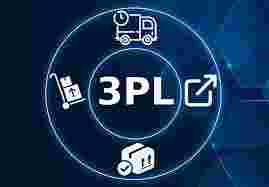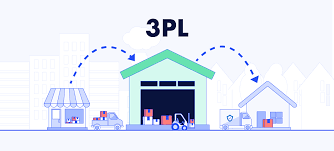Introduction: Why Smart Businesses Choose to Outsource Logistics
In today’s world of online shopping, rapid delivery, and global supply chains, getting products to customers quickly and efficiently has never been more important. Whether you’re running a small eCommerce brand from your living room or managing inventory across international markets, logistics can be overwhelming.
Enter Third-Party Logistics, or 3PL.
But exactly what is 3PL, and why are businesses — from small startups to multinational corporations — turning to it?

Let’s explore the meaning of 3PL, how it works, and most importantly, why it can be a game-changer for your business, no matter its size.
What Is 3PL? A Simple Definition
3PL stands for Third-Party Logistics — a service model where a business outsources its logistics operations (like warehousing, order fulfillment, shipping, and inventory management) to a third-party provider.
Instead of packing and shipping orders yourself or running your own warehouse, a 3PL handles all that for you. They store your inventory, pick and pack orders, coordinate shipping, and even manage returns — giving you more time to focus on your business growth.
To put it simply: You sell, they ship.
If you’ve ever ordered from an online store and received your package quickly and neatly, chances are a 3PL was involved behind the scenes.
How Does a 3PL Work?
Here’s a quick breakdown of how a 3PL works:
-
You send your inventory to the 3PL’s warehouse.
-
Customers place orders on your website or platform.
-
The 3PL receives the order info (automatically, through integration).
-
They pick, pack, and ship the order to your customer.
-
They update the tracking info, and in case of returns, they manage the process.
The entire operation is seamless and often tech-driven, making order fulfillment faster and more accurate than doing it in-house.
Why Is 3PL Important for Businesses Today?
Whether you’re just starting out or running a fast-scaling business, logistics can eat up time, money, and energy. Delayed deliveries, lost packages, or disorganized warehouses can ruin customer experience — and your brand’s reputation.
This is why understanding what is 3PL is crucial. By outsourcing logistics to a professional provider, you gain access to a system that’s already optimized for speed, accuracy, and scale.
Let’s explore how this impacts both small and large businesses differently.
Benefits of 3PL for Small Businesses
Starting a business is exciting, but fulfilling orders from your garage or spare room gets old quickly. Here's how 3PL helps small businesses scale smarter.
1. No Need for Warehousing Space
You don’t have to rent, buy, or manage a warehouse. 3PLs store your inventory in their facilities, which saves you space and money.
2. Saves Time
No more packing orders at midnight or running to the post office every day. A 3PL handles fulfillment, letting you focus on marketing, sales, and customer engagement.
3. Professional Packaging
Your products arrive neatly packed in branded or eco-friendly packaging, improving the unboxing experience for customers.
4. Lower Shipping Costs
Thanks to bulk shipping contracts with carriers like FedEx, UPS, and DHL, 3PLs offer discounted shipping rates — even for small businesses.
5. Faster Delivery
Many 3PLs operate from multiple warehouses across the country. Orders are shipped from the closest location to your customer, reducing delivery time.
Benefits of 3PL for Large Businesses
Larger companies deal with more complexity: high order volumes, multiple sales channels, international shipping, and seasonal fluctuations. 3PL helps them streamline operations.
1. Scalability During Peak Seasons
Need to ramp up fulfillment during the holidays? 3PLs can handle large spikes in orders without requiring you to hire seasonal staff.
2. Global Reach
Many 3PLs have warehouses and networks around the world, making it easier to expand into international markets with minimal effort.
3. Integrated Technology
From inventory tracking to order forecasting, 3PLs use advanced software that integrates with your systems, providing real-time data and analytics.
4. Custom Logistics Solutions
For complex operations, 3PL providers can offer value-added services like kitting, subscription box fulfillment, cold storage, and freight forwarding.
5. Risk Reduction
Delays, returns, and damaged shipments are part of logistics — but a professional 3PL knows how to manage and minimize these risks effectively.
Types of 3PL Services
Different businesses require different types of logistics support. Here's what 3PL companies typically offer:
Fulfillment Services
Storing inventory, picking, packing, and shipping orders — this is the core of most 3PL operations.
Freight and Transportation
3PLs often have access to freight carriers for large or international shipments, offering competitive rates and coordination.
Reverse Logistics
Handling returns, exchanges, and restocking efficiently — ensuring customers stay satisfied even when something goes wrong.
Inventory Management
Tracking how much stock you have, forecasting when to reorder, and avoiding overstock or stockouts.
What Is 3PL vs. 4PL?
A common question that comes up: what’s the difference between 3PL and 4PL?
-
3PL focuses on handling your logistics operations — warehousing, packing, shipping, and returns.
-
4PL (Fourth-Party Logistics) takes things further by managing your entire supply chain, including coordination between multiple 3PL providers.
Think of it this way:
-
3PL = Outsourcing logistics execution.
-
4PL = Outsourcing logistics strategy and management.
For most small and mid-size businesses, a 3PL is the best and most cost-effective choice.
Use Case: A Real-World Example
Meet Sam, founder of a D2C skincare brand. She started by packing orders from home. But as orders grew, so did mistakes, late shipments, and customer complaints.
She decided to partner with a 3PL provider.
Now, her products are stored in three fulfillment centers across the country. Orders automatically flow in, get packed, and are shipped within 24 hours. Her delivery time dropped from 7 days to 2 days, and customer satisfaction skyrocketed.
Sam now spends her time growing her business — not printing shipping labels.
When to Switch to 3PL
Still unsure if you're ready to make the jump? You might need a 3PL if:
-
Your current space is overflowing with inventory.
-
You're struggling to meet delivery deadlines.
-
You spend more time packing than growing your business.
-
You're entering new markets or launching multiple products.
-
Shipping costs are cutting into your margins.
If any of these sound familiar, now's the time to explore your 3PL options.
How to Choose the Right 3PL Partner
Choosing a 3PL is a big decision. Here’s what to consider:
-
Experience in Your Industry
Different products require different handling — make sure they’ve worked with similar businesses. -
Technology Integration
Can they integrate with your eCommerce platform, ERP, or CRM? -
Location Coverage
Do they have warehouses near your customer base? -
Transparency in Pricing
Look out for hidden fees. Ask for a detailed breakdown. -
Customer Service
Can you reach them quickly if something goes wrong?
Start small with a test run before committing long-term.
Conclusion: Logistics That Grows With You
Understanding what is 3PL and how it supports businesses at every stage is key to modern entrepreneurship. Whether you’re just starting out or running a high-volume operation, third-party logistics can give you the edge you need — better delivery times, lower costs, and less stress.
By letting experts handle logistics, you free yourself to focus on what you do best: building your brand, serving your customers, and scaling with confidence.
So the next time you're buried under boxes or losing sleep over shipping delays — remember that there's a smarter, simpler way. 3PL might just be the logistics partner you've been waiting for.




